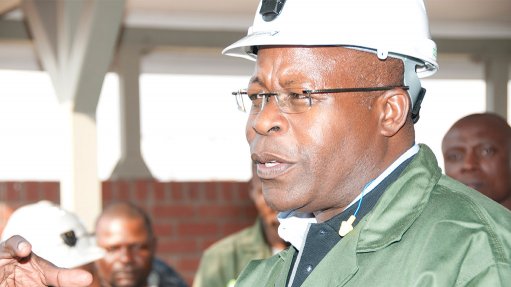
Lonmin CEO Ben Magara, who is also acting COO. Personally, he has not taken a pay increase since taking over the reins of the company in 2013
JOHANNESBURG (miningweekly.com) – Platinum company Lonmin on Thursday expressed deep concern about ongoing violence, damage to property and intimidation of employees by the near-mine Bapo Ba Mogale community, which is demanding 1 000 jobs for its members and 500 cadet positions for its unemployed youth.
The London- and Johannesburg-listed company, which recently reduced its employee complement by 6 000, declared the latest demands unrealistic as its fights for survival in the current ultra-low platinum price environment.
Lonmin currently employs 33 000 people, including contracting personnel.
The High Court of Mahikeng on May 5 granted Lonmin an interdict against the protestors barricading roads to Lonmin’s operations, intimidating employees, burning tyres and damaging property around Lonmin’s operations.
Lonmin, headed by CEO and acting COO Ben Magara who has personally refused salary increases since taking office in 2013, said in a release to Creamer Media’s Mining Weekly Online that it had met on three occasions with a delegation claiming to represent the unemployed youth of the Bapo Ba Mogale.
On May 9, the company agreed to withdraw the interdict after discussions with the Bapo delegation, which agreed to take immediate steps to stop unlawful protest action, signed an agreement to end the protest action and set out how parties would engage in the future.
However, at a follow-up meeting the next day, the Bapo delegation presented new demands for the creation of 1 000 permanent jobs and 500 cadet placements for community members, which the company pronounced as unrealistic in the current economic climate.
This month saw the platinum price collapse from an already-low $970/oz to an ultra-low $893/oz, which puts most of the industry at dire risk.
“The demands cannot be acceded to without threatening the sustainability of the business, said Lonmin, which last year handed over its resource centre to the Bapo community for unemployment data processing.
Lonmin reiterated its commitment to the pursuit of a peaceful resolution through ongoing engagement, but emphasised that it could not take short-term decisions that would have a negative impact on the sustainability of the business.
“Right now, sustainability is more important than anything,” Magara told Mining Weekly Online last month in an interview to mark his donning of the COO mantle and taking direct hands-on control of all operations.
Lonmin is one of only three integrated primary platinum-group metal (PGM) producers globally, and its Marikana operations are among the best hard rock narrow tabular mining operations on the western limb of the Bushveld Igneous Complex, the world’s platinum treasure chest.
Given the present low ebb of the PGMs market, Lonmin is going all out to bring about sustainable improvements in productivity, generate cash and bolster financial liquidity.
The company said that the near-mine community’s latest demands would have a far greater negative impact on employees, contractors, associated businesses and communities supported by the company’s social and labour plan-led initiatives.
Further, ongoing protests undermined the value of the benefits that accrued to the community through the Bapo’s equity interest in the company and committed procurement contracts.
Lonmin, which concluded a series of shareholding agreements with the Bapo Ba Mogale Traditional Community in December 2014, is also implementing an employee share ownership plan and a community share ownership trust for the benefit of the local communities on the western portion of its Marikana operations.
All three transactions collectively provided the additional equity empowerment that Lonmin needed to hit the 26% effective black economic empowerment equity ownership target demanded by the Mining Charter.
The Bapo Ba Mogale community was also awarded four procurement contracts in terms of the 2014 transaction. (See picture).
In terms of this agreement, the Bapo have been granted the opportunity to participate in procurement opportunities worth R1.65-billion over the next five years.
The Bapotrans contract, which involves community operation and management of Lonmin’s passenger transport buses, is worth R800-million over eight years.
Sadly, the bus that was destroyed during the recent protests is among the assets owned by the community as part of the procurement opportunities.
Lonmin has been buoyed in recent months by collective management, union and government representation tackling issues in unison, has been winding down high-cost promotion and closing inefficient shafts.
The 600-m-below-surface average depth of its mining operations provides a cost advantage over the industry’s 900 m to 1 000 m average.
Shareholders, including South Africa’s Public Investment Corporation as the single biggest shareholder with a 29% holding, have been supportive, and management and labour last year succeeded in turning 2015’s net $134-million operating loss into an operating profit of $7-million.
Magara has repeatedly made the point that without profitability, mining companies have no chance of contributing to South Africa’s pressing socioeconomic needs.